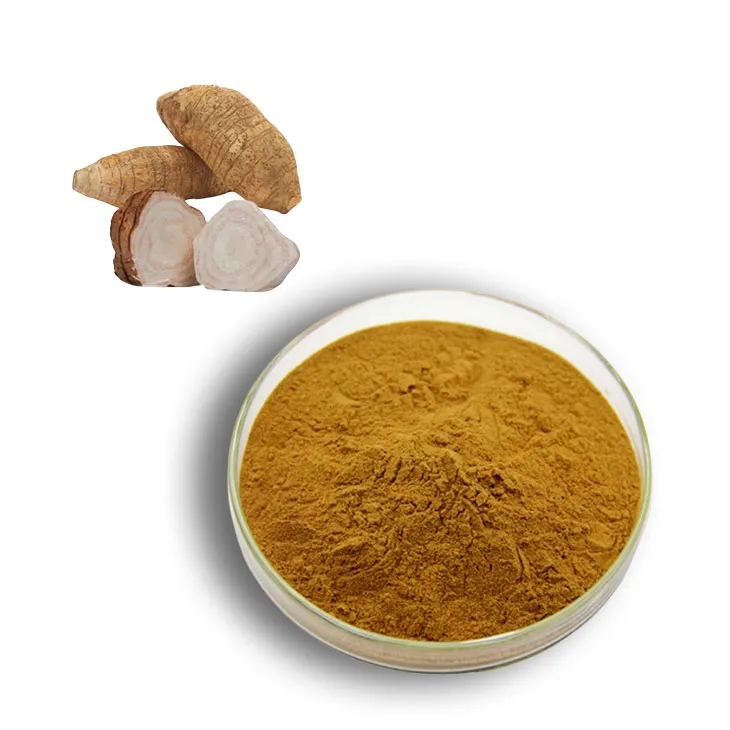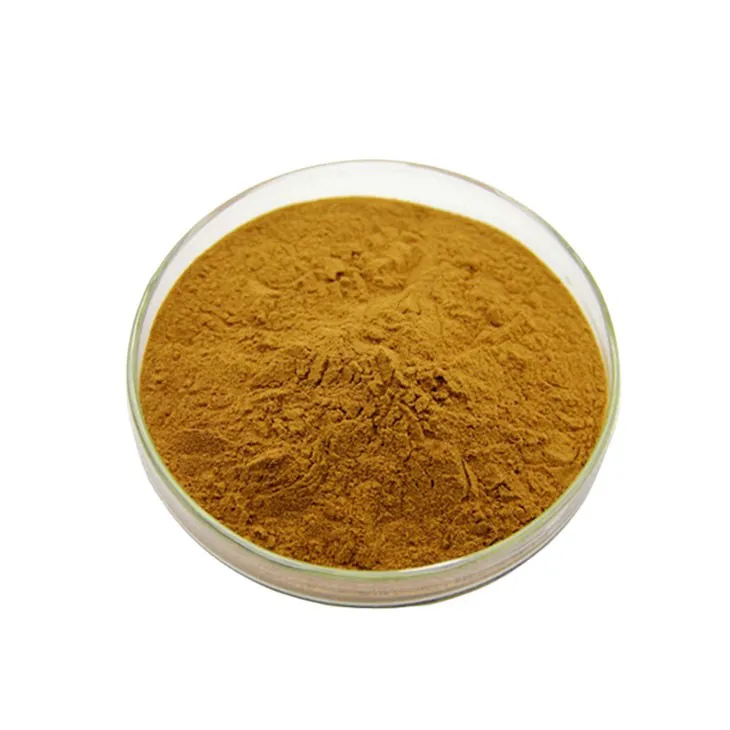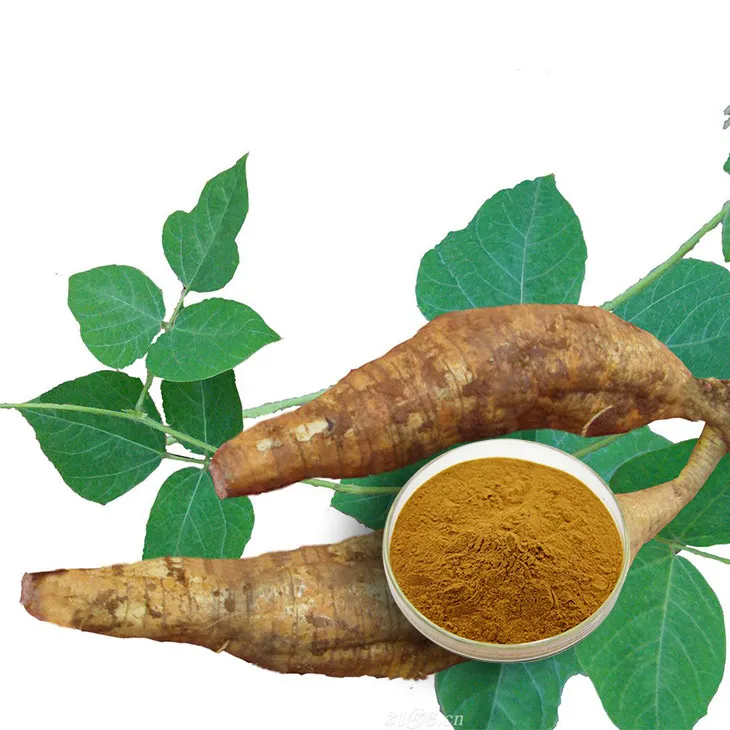- 0086-571-85302990
- sales@greenskybio.com
Understanding the Private Label of Pueraria Lobata Extract: A Comprehensive Guide
2024-12-19

1. Introduction
Pueraria lobata, also known as kudzu, has been used in traditional Chinese medicine for centuries. Pueraria Lobata Extract has gained significant attention in recent years due to its potential health benefits and various applications. This comprehensive guide aims to explore the private label of Pueraria Lobata Extract, covering aspects such as its origin, extraction methods, quality control, and market trends.

2. Source of Pueraria Lobata
Pueraria lobata is a climbing, coiling, and perennial vine native to East Asia, particularly China, Japan, and Korea. It is often found in mountainous areas, along riverbanks, and in forests. The plant has large leaves and produces purple - colored flowers. The roots of Pueraria lobata are the main part used for extraction.
2.1 Cultivation
Cultivation of Pueraria lobata has become more widespread in recent years. It can be grown in well - drained soil with sufficient sunlight. Farmers typically plant the cuttings or seeds in spring, and the plant grows rapidly during the warm and humid summer months. However, proper management is required to prevent it from becoming invasive in some regions.

3. Extraction Methods
There are several methods for extracting Pueraria Lobata Extract, each with its own characteristics.
3.1 Solvent Extraction
Solvent extraction is one of the most common methods. Organic solvents such as ethanol or methanol are often used. The process involves soaking the dried Pueraria lobata roots in the solvent for a certain period, followed by filtration and evaporation to obtain the extract. This method can effectively extract the active compounds, but it requires careful handling of the solvents to ensure safety and product quality.
3.2 Water Extraction
Water extraction is a more natural and environmentally friendly method. The roots are boiled in water for a specific time, and then the liquid is filtered and concentrated. Although this method is simpler and safer, the extraction efficiency may be lower compared to solvent extraction, and the resulting extract may have a shorter shelf - life.

4. Active Compounds in Pueraria Lobata Extract
Pueraria lobata extract contains a variety of active compounds, which are responsible for its potential health benefits.
4.1 Isoflavones
Isoflavones are one of the most important components in Pueraria lobata extract. They have estrogen - like effects and are believed to play a role in relieving menopausal symptoms, improving bone density, and reducing the risk of certain cancers. Genistein and daidzein are two common isoflavones found in the extract.
4.2 Flavonoids
Flavonoids in Pueraria lobata extract have antioxidant properties. They can scavenge free radicals in the body, protecting cells from oxidative damage. This may contribute to anti - aging, anti - inflammatory, and cardiovascular health benefits.
5. Potential Applications of Pueraria Lobata Extract
The unique composition of Pueraria lobata extract makes it suitable for a wide range of applications.
5.1 Dietary Supplements
As a dietary supplement, Pueraria lobata extract can be formulated into capsules, tablets, or powders. It is often promoted for its potential benefits in improving hormonal balance, enhancing immunity, and promoting overall health. Consumers are increasingly interested in natural products for health maintenance, and Pueraria lobata extract fits this trend.
5.2 Cosmetics
In the cosmetics industry, the antioxidant and anti - inflammatory properties of Pueraria lobata extract make it an attractive ingredient. It can be added to creams, lotions, and serums to help improve skin elasticity, reduce wrinkles, and soothe irritated skin.
5.3 Pharmaceuticals
Research is ongoing to explore the use of Pueraria lobata extract in pharmaceuticals. Some studies suggest that it may have potential in treating certain diseases such as diabetes, hypertension, and liver diseases. However, more clinical trials are needed to confirm its efficacy and safety for medical use.
6. Quality Control of Pueraria Lobata Extract
Ensuring the quality of Pueraria lobata extract is crucial for both manufacturers and consumers.
6.1 Raw Material Selection
The quality of the raw material, i.e., the Pueraria lobata roots, directly affects the quality of the extract. Roots should be sourced from reliable suppliers and be free from contaminants such as pesticides, heavy metals, and microbial infections. Quality inspection should be carried out at the source to ensure compliance with relevant standards.
6.2 Extraction Process Monitoring
During the extraction process, parameters such as temperature, time, and solvent concentration need to be carefully monitored. Deviations in these parameters can lead to variations in the composition and quality of the extract. Regular sampling and analysis should be performed to ensure that the extract meets the desired specifications.
6.3 Final Product Testing
Before the Pueraria lobata extract is packaged and sold, comprehensive testing should be carried out. This includes tests for the content of active compounds, purity, and stability. The product should also be tested for any potential allergens or adverse reactions.
7. Market Trends of Pueraria Lobata Extract
The market for Pueraria lobata extract has been growing steadily in recent years, driven by various factors.
7.1 Increasing Consumer Awareness
Consumers are becoming more aware of the potential health benefits of natural products, and Pueraria lobata extract, with its traditional use and scientific research support, is attracting more attention. This has led to an increase in demand for products containing the extract, both in domestic and international markets.
7.2 Expansion in the Dietary Supplement and Cosmetics Sectors
The dietary supplement and cosmetics sectors are two major areas of growth for Pueraria lobata extract. As consumers seek natural alternatives for health and beauty products, manufacturers are increasingly incorporating the extract into their formulations. This has led to a wider range of products available in the market, from simple supplements to high - end cosmetics.
7.3 Research and Development
Ongoing research on Pueraria lobata extract is also fueling market growth. New findings about its potential applications and health benefits are continuously emerging, which not only encourages existing manufacturers to expand their product lines but also attracts new players to enter the market.
8. Private Label Considerations for Pueraria Lobata Extract
For companies interested in creating a private label for Pueraria lobata extract, there are several important considerations.
8.1 Branding
Branding is crucial in differentiating a private label product from competitors. A unique and appealing brand name, logo, and packaging design can help attract consumers. The brand should also communicate the key features and benefits of the Pueraria lobata extract clearly.
8.2 Product Differentiation
To stand out in the market, private label products need to offer something different. This could be in the form of a higher concentration of active compounds, a unique formulation, or additional ingredients that enhance the effectiveness of the Pueraria lobata extract.
8.3 Regulatory Compliance
Compliance with regulatory requirements is essential. Different countries and regions may have different regulations regarding dietary supplements, cosmetics, and pharmaceuticals. Manufacturers need to ensure that their private label Pueraria lobata extract products meet all relevant regulations, including those related to safety, labeling, and marketing.
9. Conclusion
Pueraria lobata extract is a natural product with significant potential in various industries. Understanding its source, extraction methods, active compounds, potential applications, quality control, and market trends is essential for those interested in its private label. By considering these aspects carefully, companies can develop high - quality private label products that meet the needs of consumers and comply with regulatory requirements.
FAQ:
What is Pueraria Lobata Extract?
Pueraria lobata extract is a substance obtained from the Pueraria lobata plant. It contains various bioactive compounds that have potential health - related properties. The plant is native to Asia and has been used in traditional medicine for centuries.
What are the common extraction methods of Pueraria Lobata Extract?
Common extraction methods include solvent extraction. For example, using ethanol or water as solvents to extract the active components from the Pueraria lobata. Another method is supercritical fluid extraction, which can provide a more pure and high - quality extract under certain conditions.
What are the potential applications of Pueraria Lobata Extract?
It has potential applications in the health and beauty industries. In the health field, it may have antioxidant, anti - inflammatory, and estrogen - like effects, which could be beneficial for conditions such as menopausal symptoms. In the beauty industry, it can be used in skincare products for its potential anti - aging and skin - whitening properties.
What are the market trends related to Pueraria Lobata Extract?
The market for Pueraria lobata extract is growing. There is an increasing demand for natural products in the global market. As more research reveals its potential benefits, it is being incorporated into a wider range of products, including dietary supplements, cosmetics, and functional foods.
What are the quality control aspects in the private label of Pueraria Lobata Extract?
Quality control aspects include ensuring the purity of the extract. This involves testing for contaminants such as heavy metals, pesticides, and microbial contaminants. Also, standardizing the content of active ingredients to ensure consistency in product quality and efficacy.
Related literature
- The Bioactive Compounds and Pharmacological Properties of Pueraria lobata"
- "Pueraria lobata Extract in Cosmetics: A Review of Its Applications and Efficacy"
- "Extraction and Characterization of Pueraria lobata Extract for Nutraceutical Applications"
- ▶ Hesperidin
- ▶ citrus bioflavonoids
- ▶ plant extract
- ▶ lycopene
- ▶ Diosmin
- ▶ Grape seed extract
- ▶ Sea buckthorn Juice Powder
- ▶ Beetroot powder
- ▶ Hops Extract
- ▶ Artichoke Extract
- ▶ Reishi mushroom extract
- ▶ Astaxanthin
- ▶ Green Tea Extract
- ▶ Curcumin Extract
- ▶ Horse Chestnut Extract
- ▶ Other Problems
- ▶ Boswellia Serrata Extract
- ▶ Resveratrol Extract
- ▶ Marigold Extract
- ▶ Grape Leaf Extract
- ▶ blog3
- ▶ blog4
- ▶ blog5
-
Pure 85% Tomentil Extract.
2024-12-19
-
Fig Extract
2024-12-19
-
Artichoke Extract
2024-12-19
-
Jujube Extract
2024-12-19
-
Dandelion Root Extract
2024-12-19
-
Horse Chestnut Extract
2024-12-19
-
Thunder God Vine Extract
2024-12-19
-
Coix Seed Extract
2024-12-19
-
Acerola Juice Powder
2024-12-19
-
Saffron Extract Powder
2024-12-19
-
Peppermint Extract Powder
2024-12-19





















